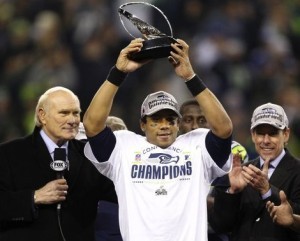
by Curtis Bunn
In his three years in the NFL, Russell Wilson has won more games than any quarterback in the league, won a Super Bowl and should have won a second a few months ago, barring a regrettable call by the coach in the waning seconds of the game.
Wilson has comported himself with utter professionalism. He’s been a leader, the consummate teammate and a shining face of the NFL.
So why are the Seattle Seahawks trying to low ball him?
Not long ago, word floated that the Seahawks would make Wilson the highest paid player in NFL history with a contract in the range of $126 million to $132 million.
It would have been a deal on par with the league’s top quarterbacks including Aaron Rodgers, Ben Roethlisberger and others. Instead, the Seahawks are offering Wilson four years at $80 million, in the range of inferior quarterbacks like Andy Dalton and Colin Kaepernick. What the what?
Of course, $80 million is not to be dismissed as paltry by a long shot. But by NFL standards, for a quarterback who has achieved what Wilson has achieved, that offer does not pass the smell test. And something smells with this.
Wilson has redefined the Black quarterback and has played better than almost all quarterbacks… and yet he is offered less than market value? To those who point to Wilson’s statistics that are not as awe-inspiring as the cheater Tom Brady or the borderline underachieving Peyton Manning and Rodgers, it should be pointed out that the idea is to win football games.
Wilson has won more than anyone.
He plays what generally is considered to be the most important position in team sports. He leads his team by example and will. He directs a run first offense, but executes with aplomb as a passer during tense, late game moments. He completes passes. His maneuverability in the pocket and sense of when to make big plays as a runner is uncanny.
If there is a flaw in his game, it has not been revealed. So, why the push back from the Seahawks?
To be fair, paying Wilson $20 million a year would impact one of the team’s strengths—the ability to sign players under the salary cap when Wilson made so little. That’s how they built the team that made consecutive Super Bowls. But that’s the team’s problem.
Wilson earned $750,000 last year and is scheduled to make about $1.5 million next season. Yes, for his production, he has been grossly underpaid. But he was the 75th pick of the draft, which explains the bargain Seattle got for three years. His salary allowed the team to acquire and retain major talents like Richard Sherman and Marshawn Lynch. It was a great three-year bargain. Now, Wilson must get paid. It’s his turn.
Lesser quarterbacks like Baltimore’s Joe Flacco and Matt Ryan, who has led the Atlanta Falcons nowhere, earn almost 20 times what Wilson makes. Not good.
Wilson never went back to the team demanding more money after leading the Seahawks to the 2014 Super Bowl. He simply played better and his team won, which entitles him to the rewards that come with such play, as other QBs before him.
Amazing is that Wilson could call off negotiations and play out the season if the sides do not move closer on a deal before training camp. It would put him in a precarious position—injuries in the NFL are common and always a scary possibility. But if he plays it out, plays well (as everyone expects), next year this time he could have a franchise tag on him and make $25 million for the 2016 season.
Injury notwithstanding, Wilson’s time will come to sign that mega-deal—this summer, next summer or the summer after that. He’ll still be under 30 and could have a few more championships by then, increasing his market value.
It’s just business, Seattle would say. But it’s regrettable business. Wilson brought the Seahawks returns on their meager investment that would catch the attention of the Securities Exchange Commission if this were Wall Street.
But it’s the NFL, and Wilson is caught in the middle of a dicey situation. The right thing for Seattle is to pay the man and move on. However, the right thing is not often done.
